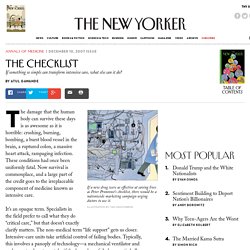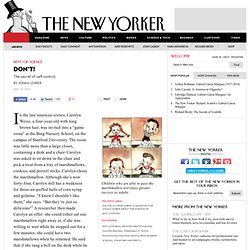

US dept of education:Grit, tenacity, perserverence. Peter Pronovost’s checklists better intensive care. The damage that the human body can survive these days is as awesome as it is horrible: crushing, burning, bombing, a burst blood vessel in the brain, a ruptured colon, a massive heart attack, rampaging infection.

These conditions had once been uniformly fatal. Now survival is commonplace, and a large part of the credit goes to the irreplaceable component of medicine known as intensive care. It’s an opaque term. Specialists in the field prefer to call what they do “critical care,” but that doesn’t exactly clarify matters. The non-medical term “life support” gets us closer. The difficulties of life support are considerable. But the emergency technicians continued CPR anyway. After six hours, her core temperature reached 98.6 degrees. First, her pupils started to react to light. What makes her recovery astounding isn’t just the idea that someone could come back from two hours in a state that would once have been considered death. Dont Follow Your Passion, Follow Your Effort. I hear it all the time from people.

“I’m passionate about it.” “I’m not going to quit, It’s my passion”. Or I hear it as advice to students and others “Follow your passion”. What a bunch of BS. “Follow Your Passion” is easily the worst advice you could ever give or get. Why ? Think about all the things you have been passionate about in your life. If you really want to know where you destiny lies, look at where you apply your time. Time is the most valuable asset you don’t own. Let me make this as clear as possible.
Habits of Mind. Hope, Grit and Resiliency. Kathryn Schulz: On being wrong. The secret of self-control. In the late nineteen-sixties, Carolyn Weisz, a four-year-old with long brown hair, was invited into a “game room” at the Bing Nursery School, on the campus of Stanford University.

The room was little more than a large closet, containing a desk and a chair. Carolyn was asked to sit down in the chair and pick a treat from a tray of marshmallows, cookies, and pretzel sticks. Carolyn chose the marshmallow. Although she’s now forty-four, Carolyn still has a weakness for those air-puffed balls of corn syrup and gelatine. “I know I shouldn’t like them,” she says. Although Carolyn has no direct memory of the experiment, and the scientists would not release any information about the subjects, she strongly suspects that she was able to delay gratification. Footage of these experiments, which were conducted over several years, is poignant, as the kids struggle to delay gratification for just a little bit longer.
The 6 Keys To Being Awesome At Everything. I've been playing tennis for nearly five decades.

I love the game and I hit the ball well, but I'm far from the player I wish I were. I've been thinking about this a lot the past couple of weeks, because I've taken the opportunity, for the first time in many years, to play tennis nearly every day. My game has gotten progressively stronger. I've had a number of rapturous moments during which I've played like the player I long to be. And almost certainly could be, even though I'm 58 years old. During the past year, I've read no fewer than five books — and a raft of scientific research — which powerfully challenge that assumption (see below for a list).
We've found, in our work with executives at dozens of organizations, that it's possible to build any given skill or capacity in the same systematic way we do a muscle: push past your comfort zone, and then rest. Why Positivity is So Essential in the Workplace. Lessons Worth Sharing. The 4-Letter Word That Everybody’s Talking About - Head Count. Denver — Here at this giant gathering of admissions officers and high-school counselors, I keep hearing the same word over and over.

People have mentioned it during sessions, uttered it over coffee, and probed its meaning in conversations. The word is “grit.” It’s as good a word as any for the determination that many educators now associate with student success. Grit, as described by some researchers, is the habit of overcoming challenges, of learning from mistakes instead of being defeated by them. One administrator described it as “that fire in the belly.” It’s long been said that test scores and grade-point averages don’t tell you the whole story about an applicant, but these days there’s growing interest in ways of measuring—and improving—student’s “noncognitive” skills, as speakers here at the National Association for College Admission Counseling’s annual meeting attested. After all, we’re learning more and more about why students succeed or fail. In short, Ms. Ms. Www.stanford.edu/~fukamit/schwartz-2008.pdf.